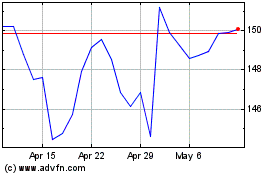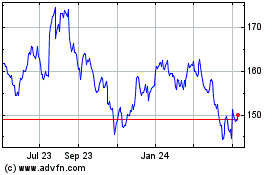U.S. Investigates Drugmaker Contracts With Pharmacy-Benefit Managers -- Update
May 10 2016 - 1:54PM
Dow Jones News
By Peter Loftus
Federal prosecutors are investigating drugmakers' contracts with
companies that manage prescription benefits in the U.S., the latest
sign of government scrutiny of how drug companies and industry
middlemen do business.
The U.S. Attorney's Office for the Southern District of New York
has sent demands for information to at least three drug companies:
Johnson & Johnson, Merck & Co. and Endo International PLC,
according to recent company filings with the U.S. Securities and
Exchange Commission.
The so-called civil investigative demands seek information about
the companies' contracts with pharmacy-benefit managers, or PBMs,
which administer drug benefits for employers and health insurers.
The drug companies didn't name any specific PBMs in their
disclosures.
J&J said in an SEC filing Tuesday it received a civil
investigative demand in March, seeking information about
contractual relationships between its Janssen Pharmaceuticals unit
and PBMs since 2006, for certain Janssen products. J&J said the
demand was issued in connection with an investigation under the
False Claims Act, a federal law that prohibits people and companies
from defrauding the federal government.
A J&J spokesman said the company is cooperating with the
investigation.
Merck said in an SEC filing Monday it received a civil
investigative demand for information about its "contracts with,
services from and payments to pharmacy-benefit managers" since
2006, in connection with the products Maxalt and Levitra. Maxalt is
a treatment for migraines and Levitra treats erectile dysfunction.
The company said it is cooperating with the investigation. A Merck
spokeswoman declined immediate comment.
Endo said in an SEC filing last week it received a demand for
documents and information about contracts with PBMs for the
migraine drug Frova. The company said it is cooperating with the
investigation. An Endo spokeswoman said the company doesn't yet
have additional details on the investigation.
A spokesman for the U.S. Attorney's Office in New York declined
to comment. A civil investigative demand is a government tool to
request information that is sometimes broader in scope than a
subpoena for documents.
The disclosures of the civil investigative demands don't
identify any PBM's by name.
Among the largest PBMs are Express Scripts Holding Co. and CVS
Health Corp. Representatives for the companies declined immediate
comment.
It is common for drug companies to agree to pay rebates or offer
other forms of discounts to PBMs in exchange for PBMs agreeing to
pay for their members' use of certain drugs.
Federal investigators in recent months have been stepping up
scrutiny of these relationships. In November, Merck said the U.S.
Attorney for the Eastern District of Pennsylvania sent it a request
for information about its pricing and contracting with PBMs and
Medicare drug-benefit plans for the asthma drug Dulera.
Last year, AstraZeneca PLC agreed to pay $7.9 million to resolve
Justice Department allegations that it provided price concessions
on drugs including Prilosec to Medco Health Solutions, a PBM, in
exchange for Medco providing favorable coverage for AstraZeneca's
heartburn drug Nexium, in violation of a federal anti-kickback
statute. AstraZeneca denied the allegations. Express Scripts, which
acquired Medco in 2012, didn't immediately respond to a request for
comment.
Federal investigators also have probed drug company
relationships with other health-care middlemen such as pharmacies.
In November, Novartis agreed to pay $390 million to settle Justice
Department allegations that it provided discounts and rebates to
specialty pharmacies to induce them to recommend that doctors
prescribe certain Novartis drugs. Specialty pharmacies dispense
drugs that can be complicated to handle and are often expensive. As
part of the settlement, Novartis said it "admits, acknowledges, and
accepts responsibility" for certain facts about its relationships
with specialty pharmacies, according to a court document.
Write to Peter Loftus at peter.loftus@wsj.com
(END) Dow Jones Newswires
May 10, 2016 13:39 ET (17:39 GMT)
Copyright (c) 2016 Dow Jones & Company, Inc.
Johnson and Johnson (NYSE:JNJ)
Historical Stock Chart
From Mar 2024 to Apr 2024

Johnson and Johnson (NYSE:JNJ)
Historical Stock Chart
From Apr 2023 to Apr 2024
